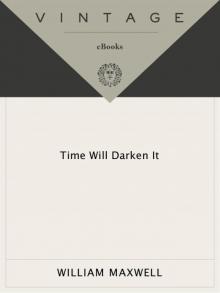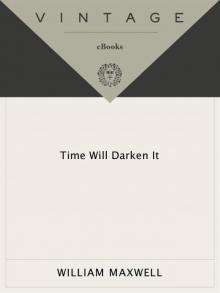- Home
- William Maxwell
Ancestors Page 10
Ancestors Read online
Page 10
Being dull and heavy in prayer is an occupational hazard of clergymen, and not difficult to understand, considering how much automatic praying is required of them. The “prevalent carnality” I take to be not his own—though, since he had seven children, it can be assumed that he was capable of sexual feelings—but that of his parishioners. And very likely what he meant was not lewdness, anyway, but unspirituality. But for a Presbyterian minister of this period to be weak and timid about publicly reproving his flock for profaning the Sabbath was not usual. What kept him from speaking out? The gentleness of his nature? An unwillingness to offend people? In years to come, gentle though he was, he offended thousands. Furthermore, he was not a timid man. He refused to join an underground organization of Catholics and Presbyterians who had taken an oath to free Ireland from British rule, and they then demanded that he speak publicly in favor of oaths and secret societies; but when he spoke, he presented his own opposing views instead, and produced such an uproar that a friend had to take him by the arm and hustle him out of the hall.
Commenting on the passage he had quoted, his son says, “Were any man, in perfect health of body, to institute a diary of his physical constitution, and proceed to feel his own pulse some three or four times per diem, and to take notes on each occasion, and, in his memorabilia, record the signs and symptoms of morning, noon, and evening, unless possessed of great self-command and vigor of intellect he would be sending for a physician at least once or twice a day to sit in solemn judgment upon his abnormal feelings and portentous symptoms.” I have a distrust of analogy, or rather the use to which it is commonly put. But in any case, he has put his finger on it; they were abnormal feelings and portentous symptoms.
When Thomas Campbell arrived at his mid-forties he showed signs of failing health. His doctor said that if he wanted to live he must stop his unremitting mental toil, and suggested that he emigrate to America. His health would be improved by the long sea-voyage and by a change from his ordinary pursuits. Richardson says he could hardly endure the thought of leaving his school and his family, and that it was his son Alexander who persuaded him finally, by saying that he himself intended to go to the United States as soon as he was of age, and that by going now, his father would be preparing a home for them all to come to.
Perhaps that is all there is to it. But I wonder if he would have agreed to such a drastic removal if it had not coincided with an impulse from another source. I know it is questionable to insert motives into the mind of a historical figure when you do not have written facts to support you, but the winds that blow over Ireland have come straight off the Atlantic, and he did not need to board a ship to breathe fresh and invigorating air. He lived to be ninety-one, which does not suggest a frail constitution. Those signs of failing health—could they have been the flag run up by a nature that was at war with itself?
That Thomas Campbell was a saintly man I see no reason to doubt. If his saintliness had been of the kind that induces visions, it would not matter where he was or, very much, who he preached to, but he does not seem to have had more than the one supernatural experience that levered him into the Presbyterian Church. He had the Bible to sustain him, but no direct communication from Heaven. Which he must have felt as a shortcoming, as in some way his own fault.
And does it require an extremely well-educated and highly intelligent man to scold villagers for not remembering the Seventh Day to keep it holy? Couldn’t any apple-cheeked country parson do as well?
His only act of any public importance had been to serve as representative of the Synod of Ireland to the General Assembly of Anti-Burghers in Glasgow, at which time he presented a petition urging the union of the two branches of the Seceder Church. The petition was adopted by the Assembly, but nothing came of it for many years.
At this time of his life he read the Bible and the Concordance and very little else. He opened the Bible and read Blessed are ye when men shall hate you, and when they shall separate you from their company, and shall reproach you, and cast out your name as evil, for the Son of man’s sake. And nobody hated him, or separated themselves from his company, or reproached him, or cast out his name as evil, so how could his reward be great in Heaven?
He read And a man’s foes shall be they of his own household. He that loveth father or mother more than me is not worthy of me: and he that loveth son or daughter more than me is not worthy of me. And he that taketh not his cross and followeth after me is not worthy of me, and knew that he was a family man, who loved his home, and that the men and women he preached to were like sons and daughters to him.
He read As ye go, preach, saying the kingdom of heaven is at hand. Heal the sick, cleanse the lepers, raise the dead, cast out devils.
Nowhere did he read Stay ye in that pleasant comfortable place and preach to the congregation that is so used to you.
He read The harvest is truly plenteous, but the laborers few, and thought, perhaps, of the Scotch-Irish immigrants in the American wilderness who had no one to preach to them.
He embarked in the spring of 1807. “Believe in the promises of the gospel,” he wrote to his children, from Londonderry. When the ship landed in Philadelphia after a voyage of thirty-five days, he discovered that the Anti-Burgher Synod of North America was meeting in the city. He presented his credentials, and was kindly received, and asked to be assigned to the Presbytery of Chartiers, in western Pennsylvania, to which some of his acquaintances had already emigrated. His request was granted. To his family he wrote, “What a debtor am I to the grace of God!… My dear children, let me address you together: if you have any sympathy, any sincere affection for a father who cannot cease to love and pray for you so long as his heart shall beat or tongue be able to articulate, see that you follow the directions I gave you at my parting, whether by word or writing. Be a comfort to your mother; love, cherish, and pity one another. Love the Lord your God; love his Son Jesus Christ, and pray to the Lord constantly and ardently for me your poor father, who longs after you all, and who cannot rest, if the Lord will, till he has prepared a place of residence for you all, where I trust we shall spend the rest of our days together in his service.”
The children so movingly addressed were Alexander, who was then nineteen, three girls of fourteen, twelve, and eight, two little boys of five and three, and a baby a little over a year old. Alexander copied the letter out in a notebook already containing numerous extracts from Young, Dr. Johnson, Buffon, Beattie, and other esteemed authors.
Thomas Campbell was allowed fifty dollars to cover the expenses of his journey over the Allegheny Mountains. His destination was Washington, Pennsylvania, a frontier community of five hundred inhabitants, situated in the midst of farms and orchards, with low wooded hills all around. The houses were mostly built of logs.
It has been suggested in a present-day book* about Thomas Campbell that it must have been exceedingly difficult for him to adjust himself readily to the rudeness and lack of culture of the American frontier. In the same way that particularly handsome men do not require beauty in the women they marry, so men of genuine cultivation are seldom put off by rudeness and lack of culture in others, and I think he was probably very happy moving among those farmers and trappers and Indian scouts. I even see him smiling benignly under a coonskin cap. How much freer life was here, and more open, must have been the thought that most often occurred to him, if for no other reason than that it was true. And he stopped seeing religious duty as something owed by the devout to the church, and instead saw it as something the church owed to all who believed in Jesus Christ.
He went two or three days up the Allegheny River by canoe to preach to a handful of people in a backwater community, and finding that they had had no opportunity to take communion for a long time, he suggested from the pulpit that all who felt so disposed and duly prepared should, without respect to party difference, “enjoy the benefits of the communion season then providentially offered them.”
He said publicly that it was not necessary to have a my
stical experience to prove that you had saving faith; faith was the intelligent response of the mind to evidence.
He said all Christians ought not to be expected to have the same opinions.
He said that it was enough to be in agreement with what is expressly taught and enjoined in the New Testament, and that nothing should be made a term of communion that is not as old as the New Testament, or that is not expressly revealed and enjoined therein—and so dismissed in one sentence the Nicene and Athanasian creeds, the Augsburg Confession, the Thirty-nine Articles, the Westminster Confession, and all doctrines that spring from them.
It would be difficult to prove that saints do not enjoy the trouble they make.
There was no preacher of comparable distinction in the Presbytery of Chartiers. The Anti-Burgher Seceder Church on the frontier was even more intolerant and conscious of religious parties than it was in either Ireland or Scotland, and its ministers were small-minded men who were fanatically preoccupied with points of doctrine. A young minister who went up the river with Thomas Campbell had been shocked and when he got home spread the story around that Thomas Campbell practiced open communion. The Reverend John Anderson was appointed to assist Thomas Campbell at Buffalo and failed to appear, and gave as his excuse that Mr. Campbell had deviated from orthodoxy. At the next meeting of the Presbytery, Anderson’s excuse was accepted.
What Thomas Campbell then did was not as spectacular as Oscar Wilde’s bringing suit for libel against the Marquis of Queensbury, but it was the same kind of injudiciousness. He made a motion that the matter of the Reverend Anderson’s excuse be reconsidered. The motion lost, and the Presbytery then inquired into Anderson’s evidence for saying that Mr. Campbell had unorthodox opinions. The committee appointed to look into the matter consisted of Anderson himself and three of his former students. Thomas Campbell was not permitted to call witnesses. His appointment to preach was temporarily suspended.
A short time later, a meeting that had supposedly been adjourned was reconvened, with Anderson and two others present, for the express purpose of making the suspension permanent.
He appealed to the Anti-Burgher Synod of North America, which was again meeting in Philadelphia, and devoted a week to hearing his case. It found that the Presbytery’s investigation had been irregular, and revoked the sentence of suspension. It then proceeded to conduct its own trial, which was both courteous and fair.
It found that Thomas Campbell had diverged from the standards and practices of the church, but could not bring itself to admit that his divergence was as great as it actually was, and so said that his answers were evasive, unsatisfactory, and equivocal, when they were in fact quite plain.
He was very angry, but could not yet readily imagine breaking with the church he had devoted the whole of his adult life to. He asked to be heard before the censure was voted on, and the Synod agreed. It clearly would have liked to arrive at a decision that was acceptable to him and to the Presbytery of Chartiers. He got the Synod to accept his explanations with regard to articles 1, 2, and 3 of the charges, but not 4, which referred to his stating publicly that when Christians did not have an opportunity of hearing ministers of their own party, it was lawful in certain circumstances for them to hear ministers of another party preach the Gospel. The Synod declared this altogether unwarrantable, and he “declared his purpose to avoid giving offense on this head as much as possible.”
The phrase “as much as possible” should have been a warning to them. He could have pointed out a dozen places in the Book of Matthew that expressly enjoined the opposite of what they were asking him to accept.
When the next session began, at six o’clock on the following morning, the moderator received and read a letter from him in which he wildly charged the Synod with partiality and equivocation and informed them that he could not accept their authority. He was summoned to appear immediately, and, standing before them, retracted the letter and acknowledged his rashness in bringing such charges and in declining the authority of the Synod.
He submitted to being “admonished and rebuked” for diverging from the rules of the church. And to being prayed over. At the bottom of the Synod’s list of preaching appointments to the presbyteries in its care appears this notation: “Mr. Th. Campbell in Phil’a, Jun., July, then in Chartiers till next meeting.” So he should have been in good standing once more. But while he was preaching in Philadelphia, the Presbytery held a meeting and the members dissented—though how they were in a position to do this I do not understand—from some of the findings of the Synod and particularly from the Synod’s action in removing Thomas Campbell’s suspension. He arrived in Washington and found that no arrangement had been made for him to preach anywhere. He asked why, and was told that they weren’t sure he wasn’t intending to stay on in Philadelphia, and anyway, he hadn’t told them when he was returning. The Presbytery’s copy of the minutes of the Philadelphia meeting did not agree in all particulars with the copy he himself had made—the softened verdict, in which the word “evasive” was struck out, and the final alteration of the Synod’s tone had been omitted—and it was therefore a fraudulent misrepresentation both of his position and the position of the Synod.
The minutes of the Presbytery for September 13, 1808, contain the statement that on this day Thomas Campbell “in his own name and in the name of all who adhered to him, declined the authority of this Presbytery for reasons formerly given, the authority of the Associate Synod of North America and all courts subordinate thereto, and all further communications with them.”
This time he didn’t take it back.
During the period when things were going well for him, Thomas Campbell instructed his family to join him in America. His letter, written in January, was delivered in March, and there was a further delay when the younger children came down with smallpox.
It was the beginning of October when the family embarked, on a sailing vessel that could hardly have escaped disaster. The crew was young and inexperienced, the captain was a drunkard. The ship was blown off its course by adverse winds and ended up off the island of Islay in the Hebrides. The captain ran it into a crooked inlet and, even though he was warned that many vessels had been wrecked there, dropped anchor and waited for the wind to change, so he could return to the open sea.
On the evening of the third day, Alexander Campbell fell asleep over a book in his cabin and dreamed that the ship struck a rock and filled with water, and that he had to make the most strenuous exertions to save his family and secure their luggage. On waking, he felt the force of the dream so strongly that he said, “I will not undress tonight. I will lay my shoes within my reach, and be ready to rise at a moment’s warning; and I would advise you all to be prepared for an emergency.” A few hours later, the wind shifted, and the ship dragged its anchors and was dashed against a sunken rock and went clear over on its side. The sailors cut away the masts, and the ship partly righted itself, but then began to fill with water, and one has the feeling of having read the whole thing before, in Act I of Shakespeare’s The Tempest. While the wild waters were in a roar and the sea mounting to the welkin’s cheek and the passengers with whatever baggage they could rescue were crowded on the upper deck, young Alexander Campbell, having done all he could for the safety of his family, sat on the stump of a broken mast, Richardson says, and abandoned himself to reflection. “In the near prospect of death he felt, as never before, the vanity of life. The world now seemed a worthless void.… He thought of his father’s noble life, dedicated to God and the salvation of his fellow-beings,” and made up his mind to devote his life also to this elevated and most worthy calling.
The captain managed to get ashore in a rowboat, but he was so drunk nobody believed his story until daylight, when the islanders could see that a ship had run aground. They began to gather upon the beach, and by means of a rope line managed to get a boat out to the ship; the passengers were brought to shore, women and children first—but only, Richardson says, because “the more resolute, draw
ing their swords, stood at the gangway and threatened to cut down any man that dared to go until the weaker portion of the passengers were landed.”
Wading ashore through the surf, Alexander found his mother and the children all safe, and they rejoiced together at their merciful deliverance. He then “repaired with the family to the nearest and most respectable house he saw,” where they were warmly received by a widow lady with a respectable fortune and several grown-up daughters. Her husband, a clergyman, was said to have translated from the Gaelic many of the poems of Ossian. “This lady’s maiden name was Campbell, and when it was discovered that her guests were of that name, she, as well as all the rest of the people, seemed to redouble her attentions, for as it now appeared, instead of going to America, they had been thrown directly among the Campbells of Argyleshire, from whom they deduced their lineage.… Warmed, dried and refreshed, along with many others of the passengers they proceeded to the town, which was about two miles off, where they obtained lodgings in the house of a Mr. McCallister. Here they meditated with grateful hearts upon the eventful scenes through which they had just passed, and recalling the premonition given by Alexander, were assured by him that the reality, as it occurred, was precisely what appeared to him in the forewarning.… He was a firm believer in special providences.… With him, these were simply facts, which he did not pretend to explain upon natural principles, but regarded as indications of God’s watchful care and interest in the affairs of his people.”

 The Chateau
The Chateau Time Will Darken It Time Will Darken It
Time Will Darken It Time Will Darken It The Heavenly Tenants
The Heavenly Tenants They Came Like Swallows
They Came Like Swallows So Long, See You Tomorrow
So Long, See You Tomorrow The Folded Leaf
The Folded Leaf All the Days and Nights
All the Days and Nights Time Will Darken It
Time Will Darken It Ancestors
Ancestors